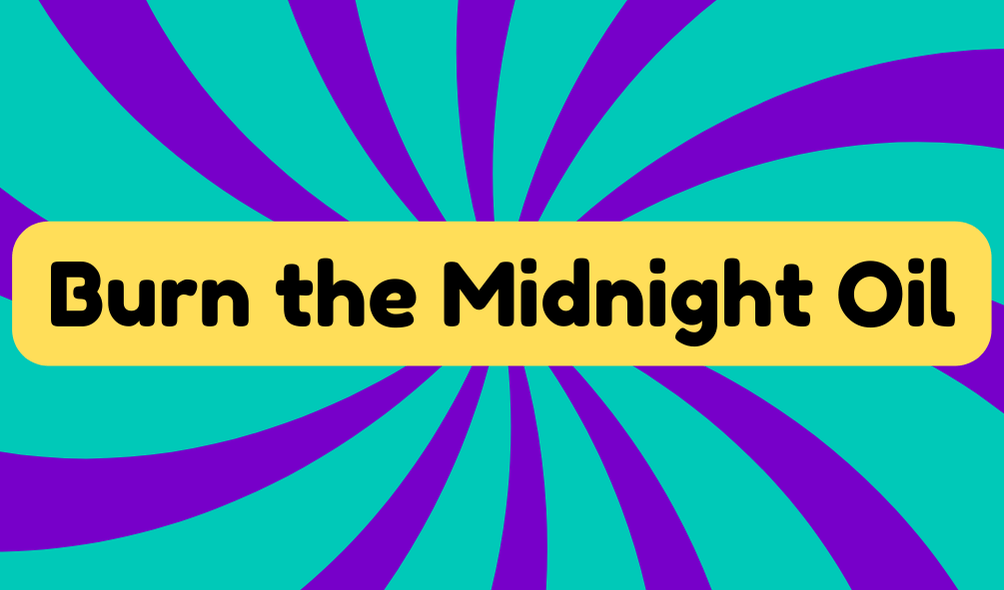The phrase "burn the midnight oil" refers to the practice of working late into the night, often at the expense of sleep. Historically, this term originated in the 17th century, when people used oil lamps for light while working. Today, the concept is prevalent in various fields, particularly among students and professionals facing deadlines. While this dedication can boost short-term productivity, it raises important questions about long-term health and work-life balance. Culture often glorifies late nights, but sustainable practices are essential. Understanding this balance is vital for well-being and effective performance in a fast-paced society. There's much more to explore.
Synonyms
In the domain of productivity and diligence, several synonyms can effectively capture the essence of "burning the midnight oil." Expressions such as "working late," "pulling an all-nighter," and "staying up late" encompass the core idea of engaging in significant tasks or studies well into the night. While nocturnal productivity may seem appealing, one should critically examine the implications of such late-night focus on mental and physical well-being. It's crucial to acknowledge the balance between work and rest. Consider the following:
- Productivity Gains: Does late-night work truly enhance output?
- Health Consequences: Is sacrificing sleep worth the return on effort?
- Sustainable Practices: Can innovative solutions be developed that respect natural rhythms?
Striking a balance is fundamental for long-term success.
Example of Sentences
Numerous examples illustrate the idiom "burn the midnight oil" in various contexts. This phrase often highlights late night productivity and the prevalence of nocturnal habits among individuals aiming to meet their goals. Here are three situations that encapsulate its essence:
- High school students routinely burn the midnight oil to prepare for important exams.
- Creative professionals often find inspiration after hours, sacrificing sleep to pursue their projects.
- Entrepreneurs frequently dedicate late nights to refining business plans, believing it is fundamental for startup success.
While these instances reflect dedication, it is important to recognize the potential downsides of continuous late-night efforts. Ultimately, one must balance productivity with rest, as long-term success relies on thoughtful timing and self-care.
Origin
The idiom "burn the midnight oil" has a rich historical background that dates back to a time when oil lamps and candles served as primary sources of light. Its first printed reference emerged in 1635 by author Francis Quarles, highlighting the dedication to nocturnal labor. This expression carries significant historical relevance, symbolizing the societal drive towards intellectual pursuit and industriousness. However, its implications in today's culture invite critical reflection. While it celebrates hard work, it also raises concerns about work-life balance and the pressure to remain productive at all hours. Consequently, as we embrace innovation, we must consider the historical significance and societal implications of burning the midnight oil, fostering a dialogue around the value of rest alongside dedication.
Collocations
Collocations associated with the phrase "burn the midnight oil" enhance its meaning and contextual understanding. Understanding these collocations can provide deeper insights into work habits intertwined with sleep deprivation.
- Late-night studying – emphasizes the academic pressure faced by many students.
- Intensive deadlines – highlights the urgency that drives professionals to work beyond typical hours.
- Chronic tiredness – underlines the physical toll taking on those who prioritize productivity over sleep.
These phrases illustrate a culture where working late is often glorified, yet it raises critical questions about sustainability and health. While dedication is commendable, the potential repercussions on well-being deserve attention. Balancing productivity with appropriate rest is essential to innovate without compromising health.
How to Use in Everyday Language
Often utilized in both professional and academic contexts, the phrase "burn the midnight oil" effectively conveys the commitment to working late and exerting effort for productivity. While it can symbolize dedication, one must consider the potential downsides of such nightly routines. Balancing productivity tips with a healthy approach to work is essential. Over-reliance on this mindset may lead to burnout, undermining both creativity and efficiency. Instead of routinely sacrificing sleep, individuals should explore sustainable methods for achieving goals, such as setting realistic deadlines and prioritizing tasks. Encouraging innovation and effectiveness means rethinking the glorification of constant work. Ultimately, while burning the midnight oil may seem admirable, it's vital to remember that rest is an integral part of sustained success.
Why Is It Still Relevant Today?
Numerous professionals and students continue to find the phrase "burn the midnight oil" relevant in today's fast-paced and demanding environments. Its cultural significance emanates from a long-standing commitment to hard work, but modern implications often highlight the struggle between productivity and well-being.
| Cultural Context | Modern Application |
|---|---|
| 17th-century oil lamps | Late-night study sessions |
| Historical dedication | Work deadlines |
| Intellectual pursuits | Start-up hustle |
| Musical references | Academic pressure |
| Language evolution | Millennial workloads |
While dedication is commendable, it is imperative to acknowledge the potential downsides that come with this relentless pursuit. Striking a balance between effort and self-care is essential in an era where innovative thinking is key.







